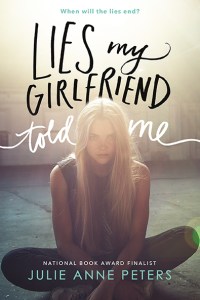Author Q&A with Julie Anne Peters
Critically renowned National Book Award finalist Julie Anne Peters has been a pioneering author of queer young adult literature since the publication of Keeping You a Secret in 2003. Her novel Lies My Girlfriend Told Me, a story about relationships, trust, romance, and loss, is out now in paperback for the first time.
As one of the founding authors of LGBTQ YA, how has the genre changed since you started writing?
I can’t even spell revolutionary, so it was simply a matter of being at the right place at the right time. My editor and agent were both nagging me to write a lesbian love story. I thought they had a death wish for me to come out in such a public way. It took a year to get over my fear, but when I began to write the book, it was the most fun I’d ever had. All the emotions felt true and honest. And from the hundreds (maybe thousands) of letters I’ve received from young and young-at-heart people going through that coming-out process, I know how important Keeping You a Secret was and still is.
Today we’ve progressed beyond the coming-out experience—not that it isn’t at the core of where we begin. But authors are writing about topics in the everyday life of a queer person—falling in and out of love, family and friend dynamics, and self-expression. Queer literature now spans the genres of fantasy, science fiction, and romance to picture and chapter books. It encompasses the entire spectrum of LGBTQI people as protagonists, antagonists, and minor characters who embrace us or don’t.
How has your writing evolved since your first book?
I’m always working to improve. A writer can never sit on his/her laurels because laurels are temporary and hang on a wall. The one thing I learned came from a reader’s review, which said something along the lines of, “Her teenspeak really sounds fake.” Ouch. After that, I just used natural dialogue and stayed in touch with pop culture. There’s nothing worse than being accused of inauthenticity.
How do you handle harsh criticism of your work?
Criticism is tough to take, especially when you’ve worked so hard and your book feels like your baby. But if you want to be a writer, the first thing you learn is how to deal with rejection. I remember one time I got the worst review on a book and my agent said, “Oh, blow it off, Julie. Someone peed in that person’s Wheaties.”
Nowadays I don’t read reviews, good or bad. I always seem to take away the bad stuff, and it’s not healthy for me.
Where do you find ideas for your books, and how do you create unique characters?
My ideas come from my own life… articles I read, stories I hear, and my imagination. I’d say most writers are avid readers like you, and should be. You learn the most about writing by reading, finding books and authors you love, and identifying what it is about their work that touches you. Then, just jump in. You don’t have to be particularly original if you have a fresh voice.
What kind of books do you read in your free time?
Besides YA, my favorites are mysteries, thrillers (not too violent), police procedurals, funny books, biographies, and strong character-based literature.
I love the Joe Pickett books by C.J. Box, Jeff Lindsay’s Dexter series, Kent Haruf’s heart-wrenching stories, Michael Connelly’s Harry Bosch books, and Janet Evanovich (of course).
